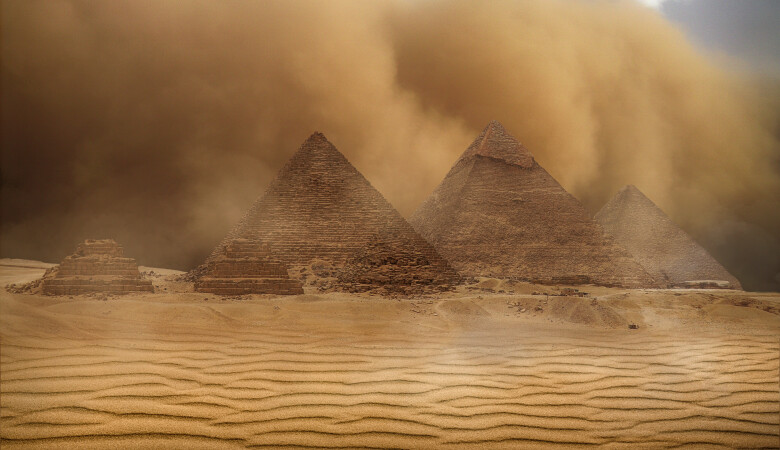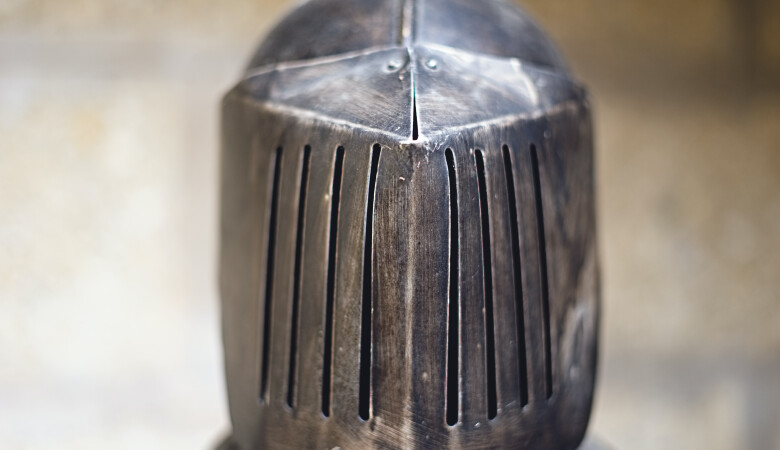His Hand is Still Upraised (Isaiah Sermon 9 of 80)
June 29, 2008 | Andy Davis
Isaiah 9:8-10:4
Wrath of God, Works of the Flesh, Repentance
Pastor Andy Davis preaches a verse-by-verse expository sermon on Isaiah 9:8-10:4. The main subject of the sermon is learning to fear the righteous and holy wrath of God.
- SERMON TRANSCRIPT -
I. Introduction
One of the most sober responsibilities I have as a preacher of the word of God is to urge you to flee from the wrath to come because there is a wrath that is coming. One of the greatest joys of my ministry is to tell you that there is a place to flee to. The cross of Jesus Christ is a safe sanctuary from the wrath of God. One of the saddest thoughts in my mind now as I come up to preach is that there are some that are going to hear me today that will experience the wrath of God for all eternity. I don't know who they might be but I preach with that in mind today, that there may be some listening to me today that will experience the wrath of God for all eternity in hell. And a great joy that I have is to think that many who listen to me today are free from the wrath of God, and for them there is no condemnation and they will spend eternity in the presence of God and not suffer his wrath. And so it is a mixed ministry that I have today, because our text today speaks of the anger of God and of his wrath. And for me as a pastor, I have to think what words can I use to make that day, the day of reckoning, so vivid in your minds that you deal seriously with it. What words could I use?
This was a problem for a pastor, a visiting pastor who was in a pulpit in Enfield, Connecticut in 1741 while revival fires were sweeping over New England, and really all over the American colonies. But not every community was experiencing the revival. It had passed by Enfield, Connecticut. As they came to church that day to hear a guest preacher, they were laughing, joking, lighthearted, with no sense of seriousness, no sense of the presence of God, just goofing off as they came into the sanctuary and sat down to hear Jonathan Edwards preach Sinners in the Hands of an Angry God, one of the most famous sermons in all history. His text that day, Deuteronomy 32:35 (KJV) was, "Their foot shall slide in due time." In other words, just because you haven't seen the wrath of God or the judgment of God on sin yet doesn't mean it isn't coming. And his doctrine was this: there is nothing that keeps wicked men at any one moment out of hell but the mere pleasure of God, and the God who keeps you out of hell is angry with you for your sin. Speaking of the wicked, of unregenerate people, that was the doctrine.
It is a very famous sermon, Sinners in the Hands of an Angry God, and it is a troublesome view of God to people in the 20th and 21st centuries. They fight against it. They deny that it's true, and they write little poems and they study it in high school literature classes as though it were some strange thing from a bygone era, like opening up some kind of time capsule with a strange aroma that wafts up out of the time capsule. How could it really be true? And so one clever poet wrote this about Edwards and Sinners in the Hands of an Angry God. This is what she wrote:
And if they had been taught aright,
Small children carried bedwards
Would shudder lest they meet that night
The God of Mr. Edwards.
Abraham's God, the Wrathful One,
Intolerant of error -
Not God the Father or the Son
But God the Holy Terror.
Well, that's a clever ditty. But it fails to deal with the question: is the reality of the wrath of God that Edwards was preaching about true? Is it really going to happen? Is there in fact going to be a judgment day? Is there in fact going to be a hell where the reprobate will spend eternity suffering the torment of God? Is that true or not?
And if it were true, how could a preacher, like Edwards or like me, craft, if that's the right word, words to awaken his hearers to the seriousness of the issue. What kind of words would you use? But that sermon has taken hold in American imagination. Some years ago, we saw the Disney movie Pollyanna. I don't know if you remember that. Hayley Mills plays a little optimistic girl who goes through a trial and her optimism is tested. But earlier in the movie, she sits through a sermon by Reverend Ford, played by Karl Malden, and he used this phrase almost taken exactly from Sinners in the Hands of Angry God, and he makes the chandelier shake as he preaches. I don't think I could do that today. I don't know how I would do that or to what effect, but he did it. And the people were just looking like they wanted to be ill and one man walks out and a horse neighs and he says, "Exactly" to the horse. Kind of mocking. So afterwards, Hayley Mills, Pollyanna, finds Reverend Ford out in the field as he is practicing yet another such sermon. And she says, "Do you know that my father," who is a missionary, "my father told me there are over eight hundred happy verses in the Bible. Why don't you preach one of those?" And he actually is transformed and then he says, "That's enough for sixteen years worth of preaching on the happy texts in the Bible."
Well, listen, I think it's marvelous to preach on a happy text of the Bible. I love one in particular. How about this one? Romans 8:1, "Therefore, there is now no condemnation for those who are in Christ Jesus." Is that a happy text in the Bible? But what does it mean if you don't know what condemnation is? What does it mean to be saved if you don't know what you're being saved from? And therefore paradoxically, some of the happiest people on the face of the earth are Christians who have stared down biblically into the doctrine of the wrath of God and found escape through faith in Christ and they are forever free and joy-filled and happy. There's a happy text for you.
But happy text or not, I want to know, is it true? And if it is true, how can a preacher awaken the consciences of his hearers to deal seriously with the doctrines there? Is this an archaic view of God, a mythological view of God that God is angry, passionately angry about sin and that he will act on that anger in acts of judgment? Is God angry with the human race? Is he angry with sinners? And if you look in the text, four times we see a reference to God's anger and wrath connected to Israel's sin:
- Look at chapter 9 verse 12 - "Yet for all this,” it says, “his anger is not turned away, his hand is still upraised."
- Isaiah 9:17 - "Yet for all this, his anger is not turned away, his hand is still upraised."
- Isaiah 9:21- "Yet for all this, his anger is not turned away, his hand is still upraised."
- Chapter 10 verse 4 - "Yet for all this, his anger is not turned away, his hand is still upraised."
It's as if Isaiah is saying, God's wrath is not so easily extinguished. Even after all of that judgment, there is still more to come. It is a relentless, terrifying force, inescapable were it not for the cross of Christ. Isaiah is saying to Israel, "Yes, God has struck you and he isn't finished yet. There is still more to come." That's what he is saying again and again.
Now for us as Christians, I believe you really can't have the true joy of the Lord without understanding the doctrine of the wrath of God and of hell. You will not rightly esteem what Jesus did for you if you don't stare down into this doctrine and understand it. You will not give him the glory that he deserves for taking your cross up that hill and dying under the wrath you deserve if you don't study this doctrine. And so, amazingly, great joy, happiness, and security come for the Christian in studying this.
But what of the non-Christian? You are on my mind. I don't know who you are. Your faces tell me nothing of your status before God. I don't know who you are, you who are lost, who have come here today for whatever reasons. I don't know who you are, but I warn you to flee the wrath to come because there is a wrath to come. And I tell you the good news, there is a place to flee to and it is the cross of Jesus Christ. That's the sermon.
II. The Wrath of God: Pure, Holy, and Perfect
Not the God of the Greeks: Emotionless and Detached
Now this is just a historical prophecy set in the midst of Israel's history, but it teaches a timeless transcendent lesson that God is passionate, he is angry about sin. And there is a place to flee to, and that is Christ. So we look at the wrath of God. It is pure. It is holy. It is perfect. He is not the god of the Greeks, the philosopher god. The stoics posited a god completely incapable of being moved to emotion. Emotions, passions, they thought, were derived from the animal nature and beneath pure deity. Aristotle spoke of the unmoved mover, a god who causes great passions in others but is himself never moved to passion - the unmoved mover. One scholar put it this way: the god of Aristotle is little involved in the world. It would have been a sign of inferiority and imperfection for him to be so. This is the reflective, typically Greek attitude: to be affected by something external to yourself is a sign of weakness. This, however, is not the God of the Bible. Our God is a passionate being. He is shown to be emotional all the time.
Let's start with the joy of God and the salvation of a single sinner. Start there. It says in Luke 15:10, "In the same way, I tell you, there is rejoicing in the presence of the angels of God over one sinner who repents." You know, that is in a cycle of parables: the lost sheep, the lost coin, the lost son (what we know as the prodigal son). And in the midst of that, in all three of those parables, the one who has lost something and then who exerts effort to find what's lost is the one who does the celebrating. And he or she in the parables might invite neighbors to come and celebrate. But the one who is doing the celebrating is the one who lost something and then sought and found it again. Who is that, but God? And therefore, who is the one rejoicing in that verse, Luke 15:10? "There is rejoicing in the presence of the angels of God over one sinner that repents." Well, that is God who is rejoicing. He is celebrating. And how often every day, every twenty-four hours, does he celebrate over a single sinner who repents and turns to Christ? Oh, he must be a joyful being constantly seeing therefore a single sinner who repents and comes to faith in Christ.
So there is joy. Zephaniah 3:17 pictures a very emotional God who rejoices over his people with singing. Zephaniah 3:17 says, "The Lord your God is with you, he is mighty to save. He will take great delight in you, he will quiet you with his love, he will rejoice over you with singing." Oh, what a picture - God singing over you! Who am I that God should sing over me? Well, if I ask that question, I haven't understood the gospel of grace. It's not who I am. It's who he is that he would sing over people like us. Oh, the grace and the love of God! But he is an emotional being. There are many other emotions ascribed to God in the Bible. For example, compassion - the Lord is gracious and compassionate. That means he is moved by the feelings of others. Grief or sadness or distress is ascribed to God. Isaiah 63:10 speaks of the sin of the Jews and says, “… they rebelled and grieved his Holy Spirit.” So God is capable of grief. Or longing - Isaiah 30:18 says, "The Lord longs to be gracious to you; he rises to show you compassion." It is an emotional being we serve. And he has other emotions as well, but the issue here is the issue of anger or wrath.
God Involved and Passionate
Therefore, God is involved in human history and he is passionate about his involvement. It means something to him. And that passion includes anger over sin. Listen to Psalm 18:7-13. “The earth trembled and quaked, and the foundations of the mountains shook; they trembled because he was angry. Smoke rose from his nostrils; consuming fire came from his mouth, burning coals blazed out of it. He parted the heavens and came down; dark clouds were under his feet. He mounted the cherubim and flew; he soared on the wings of the wind. He made darkness his covering, his canopy around him- the dark rain clouds of the sky. Out of the brightness of his presence clouds advanced, with hailstones and bolts of lightning. The Lord thundered from heaven; the voice of the Most High resounded.”
Slow to Anger… But Overwhelming When It Comes
Now I think we have trouble with a picture of the wrath and the anger of God because of how easily we get angry. We get angry for prideful reasons, or when we are inconvenienced, or things like that. When we don't get a pleasure that we like, we get angry. God is nothing like that. God's anger is pure and holy. And the scripture reveals again and again that God is slow to anger, very slow to anger. But the anger, Isaiah 9 and 10, is overwhelming when it comes. There is nothing a human being can do to stop it when God pours out his wrath. Very powerful. And God is slow to anger. Exodus 34:6, “He passed in front of Moses, proclaiming, ‘The Lord, the Lord, the compassionate and gracious God, slow to anger, abounding in love and faithfulness.’” But once that anger comes, there is nothing we can do to stop it. He is the only one who can stop it.
I remember when I was working as an engineer and making a machine called an ion implanter. It had a big, heavy wheel that spun around really fast, and I needed to have a way to brake it to stop it quickly. So we set up a test with a big thousand pound steel wheel and a big motor, and this brake mechanism. I'll never forget the first test of the brake that was inadequate, watching the wheel start to turn slowly at first, a little more quickly, a little faster, faster, faster, really fast now. I mean, it was flying, a blur, this big thousand-pound steel wheel going so fast it was blurring. When they engaged the brake, the thing just exploded. We were behind a protective wall, thank goodness. But that was an inadequate brake. It just couldn't be stopped. That is nothing compared to the wrath of God. There is nothing we can do to stop it. When God wants to pour out his wrath, he will pour it out and nothing can stop it. It's terrifying.
Isaiah 9 and 10 depict four distinct judgments that come on Israel because of their sin. And each ends with this arresting phrase, "Yet for all this, his anger is not turned away, his hand is still upraised."
III. Judgment #1: Stubborn Pride Results in Invasion (9:8-12)
Israel’s Stubborn Pride: “We Will Rebuild It Even Better!!”
Look at the first judgment, verses 8 through 12. Stubborn pride results in invasion: “The Lord [verse 8] has sent a message against Jacob; it will fall on Israel. All the people will know it- Ephraim and the inhabitants of Samaria- who say with pride and arrogance of heart, ‘The bricks have fallen down, but we will rebuild with dressed stone; the fig trees have been felled, but we will replace them with cedars.’ But the Lord has strengthened Rezin's foes against them and has spurred their enemies on. Arameans from the east and Philistines from the west have devoured Israel with open mouth. Yet for all this, his anger is not turned away, his hand is still upraised.” Do you see Israel's stubborn pride? Yes, we've been destroyed, but we are going to rebuild even better. There is an arrogance here, a defiant spirit here.
God had already brought some judgment on Israel. Some of the buildings had been destroyed. There had been some destruction on the land. But they responded this way: "Alright, the bricks are gone, but it is going to get even better. We'll replace it with dressed stone." That's a higher building material, a better quality. "In the end, it is better," they're saying. "Yes, you've taken down the fig trees, but they're just weak. Wait until we replace them with cedars!" What an arrogant attitude. After the Twin Towers fell on September 11, 2001, I said to someone, "If I know the tenor of our nation, there will soon be a great deal of talk to replace those towers with one even bigger." So it is. We've got that tower. It is going to be 1,776 feet tall. It's just the way America tends to respond.
What They Should Have Done: Humble Themselves Under God
Now I don't know, and I can't connect it to the judgment of God. God hasn't sent a prophet or anything to tell us specifically that it is so. But it will be best for us as a people to come to God humbly rather than say, "This has fallen down, but we are going to make something even better in its place." But here with Israel, this is clearly a judgment of God. Isaiah told them so. And look how they respond. What should they have done? Well, they should have humbled themselves under God's mighty hand and let him raise them up in due time. James 4:8-10 says, "Come near to God and he will come near to you. Wash your hands, you sinners, and purify your hearts, you double-minded. Grieve, mourn, and wail. Change your laughter to mourning and your joy to gloom. Humble yourselves before the Lord and he will lift you up.
Result of Pride: Invasion
The result of this arrogant response is invasion. God is going to send Gentile nations to come and devour them with open mouth. First it will be minor nations like the Philistines and the Arameans. But after that Rezin's foes are coming. That's the Assyrians, and they are going to devour Israel (the northern kingdom) completely. It will be gone. “Yet for all this, his anger is not turned away, his hand is still upraised.”
IV. Judgment #2: Unrepentance Results in Leaders’ Removal (9:13-17)
That brings us to judgment number two: unrepentance resulting in the removal of leaders. Look at verses 13 through 17. “But the people have not returned to him who struck them, nor have they sought the Lord Almighty. So the Lord will cut off from Israel both head and tail, both palm branch and reed in a single day; the elders and prominent men are the head, the prophets who teach lies are the tail. Those who guide this people mislead them, and those who are guided are led astray. Therefore the Lord will take no pleasure in the young men, nor will he pity the fatherless and widows, for everyone is ungodly and wicked, every mouth speaks vileness. Yet for all this, his anger is not turned away, his hand is still upraised.”
Israel’s Willful Independence
We see, therefore, Israel's willful independence. They live an independent existence in their own minds. They have no thoughts for the God who made them and sustained their lives every day. And they have now been struck by God. There has been some kind of discipline, but they respond with arrogance.
What They Should Have Done: Repent and Return
They should have returned and repented. Look at verse 13 again. “But the people have not returned to him who struck them, nor have they sought the Lord Almighty.”
Can I just stop in the middle of this message and speak to you, just as a brother in Christ? If you ever suffer some kind of painful stroke in your life, some medical catastrophe, some financial stress, some relational difficulty, any kind of adverse providence, anything, learn to come to God, quiet and humble and yielded to what he is doing. And say, "Lord, search me and know me and show me if there is any offensive way in me. Show me my sin." And humble yourself based on what he reveals. I do not say that every sickness or every adverse circumstance comes as a direct response to our particular sins. The book of Job refutes that. But it is safe for us spiritually to come with that kind of conception. Raymond Ortlund made a clear observation on this point. He said, "When God strikes you, the biggest mistake you can make is to turn away from him, instead of turning to him and inquiring of him."
When Jonathan Edward's wife learned the shocking news that her husband had died suddenly and unexpectedly from a smallpox vaccine while he was away at Princeton, her reaction is a classic illustration of a proper response to trials from the Lord. This is what she wrote to her daughter on hearing of the death of her great husband:
"What shall I say? A holy and good God has covered us with a dark cloud. Oh, that we may kiss the rod of discipline and lay our hands on our mouths. The Lord has done it. He has made me adore his goodness, that we had him so long. But my God lives and he has my heart. Oh what a legacy my husband, and your father has left with us! We are all given to God, and there I am, and love to be."
Now, that is the way to do it, friends. “God is my true husband, He is still here and he has my heart. I trust him.” Note what she says though, "Kiss the rod of discipline." Can you do that? That takes great faith. That's what this text is urging us to do.
Result of Unrepentance: Leaders Cut Off
Now what is the result of Israel's unrepentance? Well, their leaders are cut off. God decrees in effect the decapitation of the nation. Its leaders and officials are cut off. We already saw this earlier in Isaiah. He also removes the prophets who are supposed to speak God's words to the people. Now the wickedness of Israel's leaders, both head and tail, has led them into this grave sinful state.
Remember Israel's first king Rehoboam, and how he established a false religious system that continually led that northern kingdom of Israel into sin, generation after generation? They never turned away from Rehoboam's sin. He led them right away into idolatry and they never recovered. And so look at verse 16: "Those who guide this people mislead them, and those who are guided are led astray.” As a result, wickedness is widespread. Every mouth speaks vileness all the time. There is no one righteous, not even one. And so the wrath of God is coming. “Yet for all this,” he says, “his anger is not turned away, his hand is still upraised.”
V. Judgment #3: Growing Wickedness Results in Self-Destruction (9:18-21)
That brings us to judgment number three: growing wickedness results in self-destruction. Verses 18 through 21. “Surely wickedness burns like a fire; it consumes briers and thorns, it sets the forest thickets ablaze, so that it rolls upward in a column of smoke. By the wrath of the Lord Almighty the land will be scorched and the people will be fuel for the fire; no one will spare his brother. On the right they will devour, but still be hungry; on the left they will eat, but not be satisfied. Each will feed on the flesh of his own offspring: Manasseh will feed on Ephraim, and Ephraim on Manasseh; together they will turn against Judah. Yet for all this, his anger is not turned away, his hand is still upraised.”
Israel’s Wickedness: Spreading Like a Wildfire
Here we see Israel's wickedness spreading, it says, "like a wildfire." One thing that history has shown us is the fact that sin does not stay put. It grows like a tumor. It metastasizes. It spreads like pollution. And it pollutes one well in one stream and one rivulet and river after another. It just spreads, and spreads, and spreads. It does not stay put. One chapter after Adam and Eve sin, we have the first murder. By the end of that chapter, Genesis 4, we have a man, Lamech, who marries two women, and who kills a man for insulting him and boasts over it.
By the time we get to Genesis 6:5 it says, “The Lord saw how great man's wickedness on the earth had become, and that every inclination of the thoughts of his heart was only evil all the time.” So it spread quickly. It doesn't stay put. It's like a virus. It just multiplies and keeps growing. I think any of you who have been walking with the Lord for any length of time know exactly what I'm talking about. You just take a little sin into your life and pretty soon it is dominating, destroying whole days, destroying and polluting relationships. It does not stay put. The image here is of a wild fire spreading through the land. Verse 18, “Surely wickedness burns like a fire; it consumes briers and thorns, it sets the forest thickets ablaze, so that it rolls upward in a column of smoke.”
Again and again in history, you've seen the devastation of huge fires that were started by just one little spark, just one little place. The great Chicago fire of October 1871 started in Mrs. O'Leary's barn. That whole thing about the cow kicking over the lantern was just an urban myth. But it did start in one place, just a spark on a pile of a hay, and pretty soon it spread and destroyed four square miles of that great midwestern city. Terrifying. The great London fire of 1666 started in the oven of a baker, a single baker, on Pudding Lane in the middle of the night while he was sleeping upstairs. It burned for four days and four nights destroying 13,000 homes. That was in 1666, one little place. Or in 2003, in October, Southern California saw the Cedar fire burn 280,000 acres and 22,000 homes. Started by a single man, a hunter who was lost and lit a signal fire. That is what sin is like. It starts in one place and pretty soon it spreads. It's devastating. It destroys.
What They Should Have Done: Rescued their Brothers
Now what should these people have done? Well, they should have turned toward their brothers and rescued them from sin. They should have cared. Instead of sin spreading from one person to the next, they should have been salt and light to stop the spread of corruption. That's what we are supposed to be for each other. That is what the church is supposed to be, for each other. We are supposed to love one another in order to help each other with sin, to confront a brother or a sister for sin, deal with it directly and lovingly, to stop a brother, to take the plank out of your eye and then you will see clearly to remove the speck from your brother's eye.
Galatians 6:1, if you see somebody caught in a sin, “You who are spiritual should [go and] restore him gently. But watch yourself,” because pretty soon it is going to be you that will need it too. Be humble and know that the same sin that is in them is in you too. But do it with gentleness. It should have been love.
Result of Wickedness: Brother Devours Brother
Instead, they were devouring one another, brother devouring brother, turning on each other. And it brought no satisfaction. Look at verse 20 and 21. “On the right they will devour, but still be hungry; on the left they will eat, but not be satisfied. Each will feed on the flesh of his own offspring.” It's disgusting. Five of the last six kings of the northern kingdom of Israel came to the throne by assassination. Some of them lasted only a month and then they would be assassinated in turn. They were feeding on each other, destroying each other viciously, very much like the warning that Paul gave the local church in Galatia. Galatians 5:15 - “If you keep on biting and devouring each other, watch out or you will be destroyed by each other.” Families can do the same - bickering, complaining, insulting, not loving. There is a biting and devouring that goes on, a feeding on each other's flesh instead of love. Matthew 22:39 says the second great commandment is “love your neighbor as yourself.” But they weren't doing it at all. They had thrown that off and so wrath is coming. And yet for all of this, it says, “His anger is not turned away, his hand is still upraised.”
VI. Judgment #4: Social Injustice Results in Conquest (10:1-4)
That brings us to the fourth judgment: social injustice results in conquest. Chapter 10:1-4, “Woe to those who make unjust laws, to those who issue oppressive decrees, to deprive the poor of their rights and withhold justice from the oppressed of my people, making widows their prey and robbing the fatherless. What will you do on the day of reckoning, when disaster comes from afar? To whom will you run for help? Where will you leave your riches? Nothing will remain but to cringe among the captives or fall among the slain. Yet for all this, his anger is not turned away, his hand is still upraised.”
Israel’s Injustice: Laws Against the Oppressed
Here we see Israel's injustice toward the poor. They are actually making laws to favor the rich and powerful over the oppressed and weak and needy. By the way, issues of social justice are huge in the book of Isaiah. They are huge. And I am convicted every time I get up to preach on the issues of poverty. We are a wealthy church. We have been blessed. Are we known for our lavish generosity to the poor? Not that it is important that we be known, but it is important that they know where to come. Are our consciences clear in how we are managing our money? Do we have a sacrificial pattern of service to the poor and needy around us? Does God care about the poor and needy? “Has not God chosen those who are poor in the eyes of the world to be rich in faith and to inherit the kingdom he promised those who love him” (James 2:5)?
Israel's leaders were actually making unjust laws to oppress the weak. They were taking advantage of their position and power to dominate and to crush.
What They Should Have Done: Protect the Weak
What they should have done was to have protected the weak. Social justice flows right from the character of God and it is established in the laws of Moses. God established many laws to protect the poor and needy. Landowners, for example, were not permitted to glean, to pick up the extra droppings after a harvest right to the edge of their harvest field. They were supposed to leave them for the poor. And so in the book of Ruth, we have Ruth walking behind the harvesters gleaning so that she and Naomi can have something to eat.
Every seven years, the farms were to be left fallow, completely left alone so the poor could have something to eat, and the land could be regenerated. Judges were especially commanded to be careful in their dealing with the poor. Exodus 23:6-9 says, “Do not deny justice to your poor people in their lawsuits. Have nothing to do with a false charge and do not put an innocent or honest person to death, for I will not acquit the guilty. Do not accept a bribe, for a bribe blinds those who see and twists the words of the righteous. Do not oppress an alien; you yourselves know how it feels to be aliens, because you were aliens in Egypt.”
The people were to be open handed and generous to the poor and needy. And it is very clear throughout the New Testament, particularly in I John, that a measure of saving faith is open generosity, material generosity to the poor and needy. Job, in his defense as he is summing up his plea for righteousness and his life, is very well aware of his behavior toward the poor in his life. Listen to what he said in Job 31:13-23 -
“If I have denied justice to my menservants and maidservants when they had a grievance against me, what will I do when God confronts me? What will I answer when called to account? Did not he who made me in the womb make them? Did not the same one form us both within our mothers? If I have denied the desires of the poor or let the eyes of the widow grow weary, if I have kept my bread to myself, not sharing it with the fatherless - but from my youth I reared him as would a father, and from my birth I guided the widow - if I have seen anyone perishing for lack of clothing, or a needy man without a garment, and his heart did not bless me for warming him with the fleece from my sheep, if I have raised my hand against the fatherless, knowing that I had influence in court, then let my arm fall from the shoulder, let it be broken off at the joint. For I dreaded destruction from God, and for fear of his splendor I could not do such things.
Result of Injustice: Inescapable Justice
What is the result of this injustice, this social injustice? Inescapable justice from God. Look at verses 3 and 4 again: “What will you do on the day of reckoning, when disaster comes from afar? To whom will you run for help? Where will you leave your riches? Nothing will remain but to cringe among the captives or fall among the slain. Yet for all this, his anger has not turned away, his hand is still upraised.”
So now we come to it, don't we? Is there a balm in Gilead? Is there a refuge to which we can flee? Well, I couldn't speak for two minutes at the beginning of the sermon without mentioning that refuge. Thanks be to God that there is a refuge, that we don't have to stand under the wrath of God and see all of his power concentrated down on our eternal destruction. What a terrifying thing that is. The smoke of their torment rises forever and ever in the presence of the holy angels and of the lamb. He doesn't turn away and watch his handiwork. He watches what he is doing in hell. He knows very well he is the one who is doing it. He is not squeamish about it. He will show no pity for the unregenerate sinner.
VII. The Only Refuge: The Cross of Christ
So look at verse 3 again, Isaiah 10:3 - "What will you do in the day of reckoning (that's judgment day) when disaster comes from afar (that's the coming of the judgment of God). To whom will you run for help?" Oh what is the answer? The answer is Jesus Christ. It is Jesus, the son of God, who shed his blood on the cross. That is our place of refuge. That's where we run.
The Two Greatest Displays of God’s Wrath
There are two great overwhelming displays of wrath in the Bible. The first is the cross of Christ, and the second is hell. And in the first, Jesus stood, as it were, under the lightning bolt of the wrath of God. There is a picture of a lightning bolt on the cover of the bulletin. Just look at it for a minute. Think about the power of God displayed in a lightning storm. Can you imagine knowing that the bolt of lightning was going to strike there and purposely going and standing there so that you might benefit someone else? What could it benefit? It can't, but just imagine the power concentrated down there.
Jesus is our lightning rod. Jesus is the one who absorbs the wrath of God. He knew full well what he was doing. He wasn't deceived. He wasn't tricked. God fully revealed to him in Gethsemane what it would be like to experience, to drink the cup of God's wrath. And there he is in Gethsemane, and he is down on the ground, and droplets of blood are coming from the pores of his face, and they are coagulating, dripping down like this, and he is praying with great intensity, "Father, if it is possible, may this cup be taken from me. Yet not as I will, but as you will" (Matthew 26:30). What cup? Could it not be the cup of the wrath of God poured full strength that he would drink it to its dregs? That is what is happening at the cross.
And there is no movie that can depict that. Mel Gibson can't show that. No picture can show it. It is a spiritual reality. No man died like this. But Jesus is our propitiation. It says in Romans 3:23, “All have sinned and fall short of the glory of God.” That's all of us. If you're not convinced of it, then go to the law. Look at the Ten Commandments. Have you ever denied the Lord? Have you ever disowned him? Have you ever coveted? Have you ever committed adultery in your heart? Have you ever murdered through anger, as Jesus said it would be. You are in danger of the fire of hell if you did any of these things. But we have lived for years. We have done more than we can count. It's the wrath of God. And Jesus summed all of the law of God into two. “[You shall] love the Lord your God with all your heart and with all your soul and with all your mind and with all your strength. … [and you shall] love your neighbor as yourself (Mark 12:30,31). Have you done that? Have you obeyed it every moment of your life? If not, then apart from Christ you would deserve the wrath of God.
“Full Atonement, Can It Be?”
And so Jesus came to be our propitiation. It says, “For all have sinned and fall short of the glory of God, and are justified by his grace as a gift, through the redemption that is in Christ Jesus, whom God put forward as a propitiation by his blood, to be received by faith” (Romans 3:23-25 ESV). They tell us at preacher school you shouldn't use words like propitiation. People don't know what they mean. I tell you, I didn't know what it meant. I had to learn it. I had to learn a vocabulary word. I think you can learn a vocabulary word. It means the turning aside of the wrath of God by the giving of a sacrifice, a blood sacrifice. That's what it means.
And so the blood sacrifice has been given and God's wrath has turned away. He is our propitiation. “Therefore, there is now no condemnation (that's no hell, no wrath) for those who are in Christ Jesus” (Romans 8:1). Hallelujah! Praise God. Hallelujah for all of you who have trusted in Christ, because it is a redemption that comes by grace through faith in Christ, by trusting in him. But if you have no faith in Christ the wrath of God remains on you.
I remember another job I worked at. It was called an e-beam reactor. It used a powerful magnetic field to bend an electron beam through a field down into a crucible. And I had to look through triple polarized glasses to watch that process happen. I had my finger on a button in case it messed up because it would destroy the machine and become incredibly dangerous. And it was just this concentrated beam of heat and bluish light melting this metal and depositing it on these wafers that spun around above it.
That's nothing compared to the wrath of God. The creative, or I should say, destructive intelligence of God boring down on you for all eternity. Revelation 14:11, “And the smoke of their torment rises forever and ever.” There is a wrath to come. Flee from it. I don't know your names. You who are here today who are still under the wrath of God. I can't see. I don't know who you are, but flee to Christ because there is a coming wrath.
Applying These Lessons
Now, if you have already fled, then consider two things. Consider your own condition, how grateful you ought to be that you will not have to suffer the wrath you deserve. You don't have to say it (but think it) when someone asks, "How are you doing?" Say, "Better than I deserve, infinitely better than I deserve." You don't have to say it every time. Maybe occasionally, once a week - "Better than I deserve". Be happy thereby, no matter what you are going through. You are not going to have to suffer wrath, 1 Thessalonians 5:9, “For God did not appoint us to suffer wrath but to receive salvation.”
Praise God for that. Secondly though, outwardly, you are living among a people in the land of the shadow of death. They are still under the wrath of God. John 3:36 says, "The wrath of God remains on them every day". They are not ready to die. And there is only one thing that can rescue them: the power of God for salvation, which is the gospel of Jesus Christ. And when God brings some adverse circumstance in your life, kiss the rod of discipline. Thank him for it. Don't murmur against him. Don't turn away from God and be bitter. Turn to God and say, "What are you teaching me? Get me through this time that you have brought on me."
Thirdly, please pray for our nation. July 4th is coming up, the birthday of our country. God's nation is those who have repented and trusted in Christ. That's his nation. You understand that. “Who is my mother, and who are my brothers? … whoever does the will of my Father in heaven is my brother and sister and mother” (Matthew 12:48,49). How much more then, who is Christ’s nation? It is not the United States of America, nor is it any other political entity on the face of the earth. Pray for this nation that we would repent. And when some adverse thing comes on the nation that we would have times of outpouring of prayer and seeking of the face of God--as happened, frankly, on September 12th in this nation.
Praise God for it. But all the more. It says in Jeremiah 18:7-8, "If at any time I announce that a nation or kingdom is to be uprooted, torn down and destroyed, and if that nation I warned repents of its evil, then I will relent and not inflict on it the disaster I had planned" (from Jeremiah 18, like Jonah in Nineveh). Pray for our nation on July 4th.
And finally, and this is not the last time I will mention it, understand God's intense concern for the poor and needy. Use your wealth and your time wisely. I want our church well known for generosity to the poor. And I know we need wisdom to know how to do that. God wants us to come to him and say, "What should we do about this and that and the other situation?" We need wisdom to know what to do about them.































